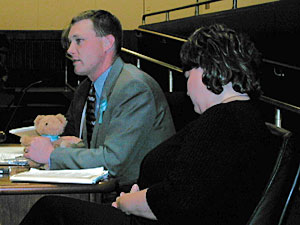Audio
Photos
Your Voice
| |||||||||||||||||||||||||||||||||||||||||||
Bills to extend statute of limitations for sexual abuse face uncertain future
April 11, 2003
 |
| Paul Dymit, 30, of Crystal, says he was sexually abused by his teacher as a teenager. (MPR Photo/Laura McCallum) |
St. Paul, Minn. — Several Minnesotans who say they were sexually abused as children urged lawmakers to extend the time limit for abuse victims to bring civil lawsuits. Under current law, victims must file suit within six years of turning 18.
Paul Dymit, 30, of Crystal, says he was sexually abused by his teacher as a teenager. He says as a result of the abuse, he dropped out of college, was addicted to gambling and considered suicide. Dymit says his teacher was recently convicted of abusing students, and sentenced to seven years in prison.
 | |||
"He had admitted to abusing up to 100 other kids. And I'm only one. I'm only one of those children who came forward. And I couldn't do it until I was 29. You can't silence those other 99 kids," he said.
Wearing blue ribbons and holding teddy bears, advocates of extending the time limit say it often takes years for victims to come forward. Susan Fuchs-Hoeschen of Sauk Rapids says she was sexually abused by a parish priest 30 years ago, at the age of 10. Fuchs-Hoeschen is a clinical social worker, and says she didn't report the abuse to law enforcement until last December.
"Despite my professional knowledge, I needed many years to realize the devastation the sexual abuse had on me. Only now as a nearly 40-year-old, I really feel I've been able to comprehend the trauma and find my voice," Fuchs-Hoeschen said.
Fuchs-Hoeschen says the statute of limitations should be tied to when a person reports the abuse to police, not when the abuse actually occurred.
Lobbyists representing school districts, churches and day care centers argued against changing the law. Bob Meeks of the Minnesota School Boards Association says it's difficult for institutions to defend against abuse charges years after the abuse allegedly took place.
"And time is of an essence. You know, memories fail, people move away, records are lost, death occurs," Meeks said.
Bills moving through the House and Senate extend the time limit in very different ways. The House bill creates an incentive to report abuse to law enforcement shortly after the abuse occurs, and would extend the time limit to no more than 14 years after the victim turns 18.
The bill headed to the Senate floor would allow victims to sue their abusers at any age, as long as the suit was within six years of discovering the link between the abuse and the injury it caused.
The House sponsor, Rep. Mary Liz Holberg, R-Lakeville, says she's not sure if a compromise can be reached this year. "I think that the ability to successfully address this issue is wholly dependent on the ability of the Legislature to work in a cooperative manner and not turn it into a partisan battle. As soon as this gets political, it's in trouble."
Holberg says there are supporters and opponents of the legislation on both sides of the aisle. She says some lawmakers have experienced sexual abuse, while others worry that changes would expose churches and other institutions to a flood of lawsuits.
Holberg chairs the House Civil Law Committee, which approved her bill on a divided voice vote. Holberg says the bill isn't perfect, and says she'll work with committee members in the next week or so to fine-tune the bill before it reaches the floor. An attempt to extend the statute of limitations for 30 years after a victim turned 18 failed in the Legislature last year.
|
News Headlines
|
Related Subjects
|

